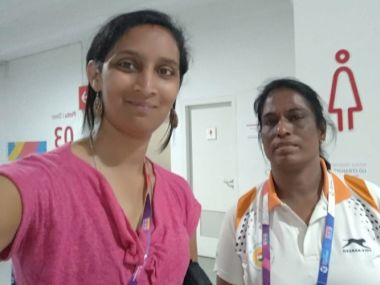26 August I expected reporting and writing on track events to be one of the toughest jobs in the Asian Games. Hockey has dribbling skills, shooting is played in the mind and shadowed by the body, and cricket has a thousand quirks, each of which can evoke a thousand words. But what do you write about people who simply run along lines? I discovered that the more you know, the more you realise how little you know. The middle distances are tactical, the relay is chaos you should pay money to see and the sprints are motion condensed into moments. All with their own hooks, and thankfully, talking points. Athletics also poses another challenge: By the time we get back to the Main Press Centre, the food is all gone, and restaurants are all closed. I discover a 24-hour McDonalds, and me and a couple of other journos have a 2 AM dinner. I am thrilled when they say they serve veggie burgers, even though I can’t see them on the menu. Not so thrilled when I’m handed a chicken burger minus the patty. 27 August A few days in the future I will sit in the media tribune watching athletics and I will wonder why I can alternately smell piss and disinfectant. I will realise that I am sitting above the men’s toilet, and will avoid that seat going forward. [caption id=“attachment_5093481” align=“alignnone” width=“825”] The author (L) with Indian athletics legend PT Usha. Image credit: Snehal Pradhan/ Firstpost[/caption] But today I’m in a toilet that isn’t stinking (do you notice how the men’s toilets stink so much more), and standing in line behind me is a legend. After I wash my hands clean, I wait outside so I can take a selfie with PT Usha. I expected to meet some of the greats in Jakarta, but not in the women’s loo. 28 August Tai Tzu Ying is heartless in her demolition of PV Sindhu in the final. Two hours before that, a few volunteers are equally heartless, insisting on not letting any media into the Istora. “It’s full,” we are told, even though we are there half an hour before the game. That’s a first. Even photographers, who don’t have the option of working in the press centre, are barred. Eventually we are let in, escorted to manufactured space behind the official broadcasters’ cameras. I get to see the Istora go wild when Jonatan Chirstie pulls off his shirt to celebrate winning the final. Indonesians do it better. Sourav Ganguly, I’m looking at you. 29 August I spend the day watching young men play video games. I’m convinced e-sports are a part of our Olympic future, and pretty soon we will be talking not about whether to include them, but which ones to leave out. The media representative there tells me that Augmented Reality games may be the next step. Maybe one day they will include Pokemon Go and I can proudly talk about the fact that I made a video on the game when I played it. It now has almost 2 lakh YouTube views. The Jakarta traffic finally accosts us on the way back from the e-sports venue to the athletics arena. This is the first real taste of unpleasantness on the trip. I have thus far been cocooned inside the Games, assuaged by smiling volunteers at every corner. But having spent most of my time in Indonesia within sports complexes, I have little idea what the place is really like. Cricket tours allow enough time to look beyond sporting confines and breathe a place in. The Games are not quite a prison sentence, but the hard labour means there is very little view of the outside world. 30 August After I write about
e-sports , there is some debate on Twitter and in the press centre as to what counts as a sport, and what should be at the Olympics. I had conceded early in the trip that it’s hard to say that chess is a sport. Bridge, that’s another contentious one. Can we put them in the category of puzzles? Then I look up videos of dressage, that equestrian sport which involves grooming a horse and making it do fancy tricks. If that’s an Olympic sport, give
The Super Collies a medal already.
Meeting PT Usha in restroom, soaking in wild Istora and covering e-sports, tour diary from Indonesia
Advertisement
End of Article


)

)
)
)
)
)
)
)
)



